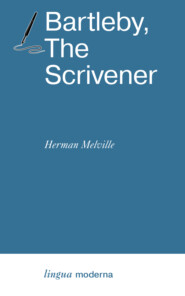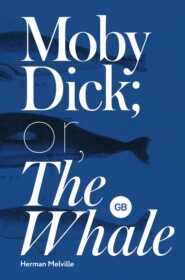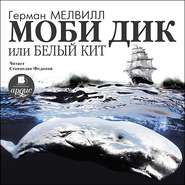По всем вопросам обращайтесь на: info@litportal.ru
(©) 2003-2025.
✖
Moby-Dick or, The Whale / Моби Дик, или Белый кит. Книга для чтения на английском языке
Настройки чтения
Размер шрифта
Высота строк
Поля
Moby-Dick or, The Whale / Моби Дик, или Белый кит. Книга для чтения на английском языке
Herman Melville
Чтение в оригинале (Каро)Classical Literature (Каро)
Герман Мелвилл (1819–1891) – выдающийся американский писатель-романтик.
«Моби Дик» (1851) – одна из признанных вершин американской прозы, философский роман о трагических попытках сильной личности бросить вызов року.
Неадаптированный текст на языке оригинала снабжен комментариями и словарем.
В формате PDF A4 сохранен издательский макет книги.
Герман Мелвилл
Moby-Dick or, The Whale / Моби Дик, или Белый кит. Книга для чтения на английском языке
© КАРО, 2006
In token
Of my admiration for his genius
This hook is inscribed
to
NATHANIEL HAWTHORNE
Etymology
(Supplied by a late consumptive Usher to a grammar school)
The pale Usher – threadbare in coat, heart, body, and brain; I see him now. He was ever dusting his old lexicons and grammars, with a queer handkerchief, mockingly embellished with all the gay flags of all the known nations of the world. He loved to dust his old grammars; it somehow mildly reminded him of his mortality.
“While you take in hand to school others, and to teach them by what name a whale-fish is to be called in our tongue, leaving out, through ignorance, the letter H, which almost alone maketh[1 - maketh – ycm. makes. Для английского языка XIX века характерно прибавление окночаний th и st к глаголам (см. здесь и далее).] up the signification of the word, you deliver that which is not true.”
Hakluyt.
“Whale. * * * Sw. and Dan. hval. This animal is named from roundness or rolling; for in Dan. hvalt is arched or vaulted.”
Webster's Dictionary.
“Whale. * * * It is more immediately from the Dut. and Ger. Wallen; A. S.[2 - A. S. (Anglo-Saxon) – англосаксонский] Walw-ian, to roll, to wallow.”
Richardson's Dictionary.
JiI, Hebrew.
xntos, Greek.
Cetus, Latin.
Whoel, Anglo-Saxon.
Hvalt, Danish.
Wal, Dutch.
Hwalt, Swedish.
Whale, Icelandic.
Whale, English.
Baleine, French.
Ballena, Spanish.
Pekee-nuee-nuee, Feegee.
Pehee-nuee-nuee, Erromangoan.
Extracts
(Supplied by a Sub-Sub-Librarian)
It will be seen that this mere painstaking burrower and grub-worm of a poor devil of a Sub-Sub appears to have gone through the long Vaticans and street-stalls of the earth, picking up whatever random allusions to whales he could anyways find in any book whatsoever, sacred or profane. Therefore you must not, in every case at least, take the higgledy-piggledy whale statements, however authentic, in these extracts, for veritable gospel cetology. Far from it. As touching the ancient authors generally, as well as the poets here appearing, these extracts are solely valuable or entertaining, as affording a glancing bird's-eye view of what has been promiscuously said, thought, fancied, and sung of Leviathan, by many nations and generations, including our own.
So fare thee well, poor devil of a Sub-Sub, whose commentator I am. Thou belongest to that hopeless, sallow tribe which no wine of this world will ever warm; and for whom even Pale Sherry would be too rosy-strong; but with whom one sometimes loves to sit, and feel poor-devilish, too; and grow convivial upon tears; and say to them bluntly with full eyes and empty glasses, and in not altogether unpleasant sadness – Give it up, Sub-Subs! For by how much the more pains ye take to please the world, by so much the more shall ye forever go thankless! Would that I could clear out Hampton Court and the Tuileries[3 - Hampton Court and the Tuileries – Хэмптон Корт (крупнейшая из королевских резиденций Великобритании) и Тюильрийский дворец (резиденция королей и императоров в Париже)] for ye! But gulp down your tears and hie aloft to the royal-mast with your hearts; for your friends who have gone before are clearing out the seven-storied heavens, and making refugees of long-pampered Gabriel, Michael, and Raphael, against your coming. Here ye strike but splintered hearts together – there, ye shall strike unsplinterable glasses!
“And God created great whales.”
Genesis.
“Leviathan maketh a path to shine after him;
One would think the deep to be hoary.”
Job.
“Now the Lord had prepared a great fish to swallow up Jonah.”
Jonah.
“There go the ships; there is that Leviathan whom thou hast made to play therein.”
Psalms.
“In that day, the Lord with his sore, and great, and strong sword, shall punish Leviathan the piercing serpent, even Leviathan that crooked serpent; and he shall slay the dragon that is in the sea.”
Isaiah[4 - Genesis, Job, Jonah, Psalms, Isaiah – Бытие, Книга Иова, Книга пророка Ионы, Книга Псалмов, Книга пророка Исайи (части Библии)].
Herman Melville
Чтение в оригинале (Каро)Classical Literature (Каро)
Герман Мелвилл (1819–1891) – выдающийся американский писатель-романтик.
«Моби Дик» (1851) – одна из признанных вершин американской прозы, философский роман о трагических попытках сильной личности бросить вызов року.
Неадаптированный текст на языке оригинала снабжен комментариями и словарем.
В формате PDF A4 сохранен издательский макет книги.
Герман Мелвилл
Moby-Dick or, The Whale / Моби Дик, или Белый кит. Книга для чтения на английском языке
© КАРО, 2006
In token
Of my admiration for his genius
This hook is inscribed
to
NATHANIEL HAWTHORNE
Etymology
(Supplied by a late consumptive Usher to a grammar school)
The pale Usher – threadbare in coat, heart, body, and brain; I see him now. He was ever dusting his old lexicons and grammars, with a queer handkerchief, mockingly embellished with all the gay flags of all the known nations of the world. He loved to dust his old grammars; it somehow mildly reminded him of his mortality.
“While you take in hand to school others, and to teach them by what name a whale-fish is to be called in our tongue, leaving out, through ignorance, the letter H, which almost alone maketh[1 - maketh – ycm. makes. Для английского языка XIX века характерно прибавление окночаний th и st к глаголам (см. здесь и далее).] up the signification of the word, you deliver that which is not true.”
Hakluyt.
“Whale. * * * Sw. and Dan. hval. This animal is named from roundness or rolling; for in Dan. hvalt is arched or vaulted.”
Webster's Dictionary.
“Whale. * * * It is more immediately from the Dut. and Ger. Wallen; A. S.[2 - A. S. (Anglo-Saxon) – англосаксонский] Walw-ian, to roll, to wallow.”
Richardson's Dictionary.
JiI, Hebrew.
xntos, Greek.
Cetus, Latin.
Whoel, Anglo-Saxon.
Hvalt, Danish.
Wal, Dutch.
Hwalt, Swedish.
Whale, Icelandic.
Whale, English.
Baleine, French.
Ballena, Spanish.
Pekee-nuee-nuee, Feegee.
Pehee-nuee-nuee, Erromangoan.
Extracts
(Supplied by a Sub-Sub-Librarian)
It will be seen that this mere painstaking burrower and grub-worm of a poor devil of a Sub-Sub appears to have gone through the long Vaticans and street-stalls of the earth, picking up whatever random allusions to whales he could anyways find in any book whatsoever, sacred or profane. Therefore you must not, in every case at least, take the higgledy-piggledy whale statements, however authentic, in these extracts, for veritable gospel cetology. Far from it. As touching the ancient authors generally, as well as the poets here appearing, these extracts are solely valuable or entertaining, as affording a glancing bird's-eye view of what has been promiscuously said, thought, fancied, and sung of Leviathan, by many nations and generations, including our own.
So fare thee well, poor devil of a Sub-Sub, whose commentator I am. Thou belongest to that hopeless, sallow tribe which no wine of this world will ever warm; and for whom even Pale Sherry would be too rosy-strong; but with whom one sometimes loves to sit, and feel poor-devilish, too; and grow convivial upon tears; and say to them bluntly with full eyes and empty glasses, and in not altogether unpleasant sadness – Give it up, Sub-Subs! For by how much the more pains ye take to please the world, by so much the more shall ye forever go thankless! Would that I could clear out Hampton Court and the Tuileries[3 - Hampton Court and the Tuileries – Хэмптон Корт (крупнейшая из королевских резиденций Великобритании) и Тюильрийский дворец (резиденция королей и императоров в Париже)] for ye! But gulp down your tears and hie aloft to the royal-mast with your hearts; for your friends who have gone before are clearing out the seven-storied heavens, and making refugees of long-pampered Gabriel, Michael, and Raphael, against your coming. Here ye strike but splintered hearts together – there, ye shall strike unsplinterable glasses!
“And God created great whales.”
Genesis.
“Leviathan maketh a path to shine after him;
One would think the deep to be hoary.”
Job.
“Now the Lord had prepared a great fish to swallow up Jonah.”
Jonah.
“There go the ships; there is that Leviathan whom thou hast made to play therein.”
Psalms.
“In that day, the Lord with his sore, and great, and strong sword, shall punish Leviathan the piercing serpent, even Leviathan that crooked serpent; and he shall slay the dragon that is in the sea.”
Isaiah[4 - Genesis, Job, Jonah, Psalms, Isaiah – Бытие, Книга Иова, Книга пророка Ионы, Книга Псалмов, Книга пророка Исайи (части Библии)].














